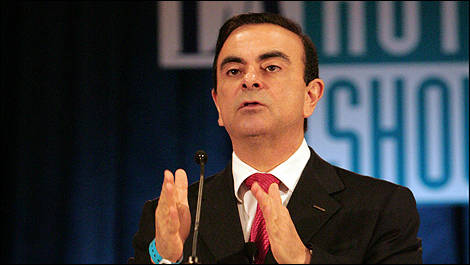Even though the manufacturer is more discrete than the others in terms of environmental technology, Nissan is just as ready to do battle on this front as well. As Carlos Ghosn, the head of the group, mentioned at the opening of the Los Angeles Auto Show, Nissan has no cause to be jealous of the competition.
An opinion that Mark Perry, director of environmental product planning for the Japanese automaker, also shares. In fact, according to Perry, not only is the company in the running, but it's even got a head start over many of its competitors.
"The difference is that we have made different choices. Several automakers chose to experiment with hybrid vehicles, but everyone knows this technology is only transitional. We have concentrated on what we believe to be the real solution in the future, electric cars. And from this point of view, our technology is already well established," explains Perry.
He mentions, for instance, that agreements have already been signed with the states of Tennessee and Oregon concerning the testing of operational electric vehicles. A strategy meant namely to ensure the support of the public and institutions, says the specialist.
The first goal is to gather operating data in the field. But the manufacturer also hopes to win the public over, so that it will put more pressure on government agencies to force the adoption of a true zero-emission-vehicle policy everywhere in America.
Nissan's vision is to provide the general public with zero-emission vehicles by 2012. And already, thanks to ongoing research on lithium-ion batteries undertaken in 1992, Nissan says it has almost found the solution. The automaker believes to be so near the answer that it has already signed an agreement with NEC for the larger scale manufacturing of the batteries. "However, it is indeed our technology, developed by our department, that is being used. We are only calling on their production capacity."
"The vehicles provided to the two States in question have an operating range of 160 kilometres, recharge to 80 % capacity in less than 26 minutes and cost less than 70 cents per full tank of gas. This is a viable solution that we could establish if the recharging installations were available. We still have a lot of research ahead of us, but we are the leaders in this field," says Perry.
"If all the developing countries counted on individual cars as much as North Americans, we would need 11 extra planets to provide the necessary resources. Some things absolutely must change, and that's what we're doing," concludes Perry.
photo:Nissan
An opinion that Mark Perry, director of environmental product planning for the Japanese automaker, also shares. In fact, according to Perry, not only is the company in the running, but it's even got a head start over many of its competitors.
 |
| Carlos Ghosn, Nissan's CEO |
"The difference is that we have made different choices. Several automakers chose to experiment with hybrid vehicles, but everyone knows this technology is only transitional. We have concentrated on what we believe to be the real solution in the future, electric cars. And from this point of view, our technology is already well established," explains Perry.
He mentions, for instance, that agreements have already been signed with the states of Tennessee and Oregon concerning the testing of operational electric vehicles. A strategy meant namely to ensure the support of the public and institutions, says the specialist.
The first goal is to gather operating data in the field. But the manufacturer also hopes to win the public over, so that it will put more pressure on government agencies to force the adoption of a true zero-emission-vehicle policy everywhere in America.
Nissan's vision is to provide the general public with zero-emission vehicles by 2012. And already, thanks to ongoing research on lithium-ion batteries undertaken in 1992, Nissan says it has almost found the solution. The automaker believes to be so near the answer that it has already signed an agreement with NEC for the larger scale manufacturing of the batteries. "However, it is indeed our technology, developed by our department, that is being used. We are only calling on their production capacity."
"The vehicles provided to the two States in question have an operating range of 160 kilometres, recharge to 80 % capacity in less than 26 minutes and cost less than 70 cents per full tank of gas. This is a viable solution that we could establish if the recharging installations were available. We still have a lot of research ahead of us, but we are the leaders in this field," says Perry.
"If all the developing countries counted on individual cars as much as North Americans, we would need 11 extra planets to provide the necessary resources. Some things absolutely must change, and that's what we're doing," concludes Perry.
photo:Nissan




